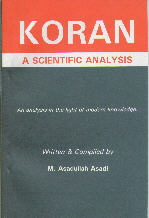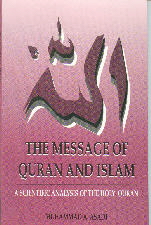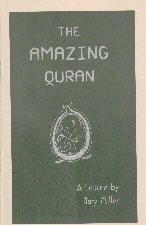


I remember sitting on the big recliner in the guestroom of my
grandparent's house, with the Koran [Qur’an] sitting on my lap. I had recently
discovered several translations of the book in my father’s closet. Coming from a
fairly religious family background, I had been taught about the basics of
traditional Islam and about the Koran being a revered, Holy Book, which only a
few people could grasp in knowledge and understanding. The contents of the Book
were thus always a mystery to me. By discovering these translations, I had
unlocked the cave of wonders, so to speak.
I had expected to find
magical material in the Koran. What I knew of religion, in the society that I
grew up in, was mostly magic and awesome miracles cloaked in a few sprinklings
of logical arguments. In the weeks and the many years to follow, I was to
discover otherwise.
One of the first things that strike any reader of the
Koran is its simplicity of expression and consistency. The thoughts are laid out
one by one; they overlap bearing no temporal limitations, due to the unique
nature of the book, contrary to books produced by human minds. It is here that
people get confused and give up on the Book. Once you get a grasp of the trend
of the Koran, its consistency of words and thoughts, you see a unity not seen in
any book produced by the human mind [any that I have read at least]. This aspect
of the Koran stunned me very early on as I progressed in my reading.
I
was 13 when I first discovered the Koran in English. Part of my motivation to
read it was to get some “spiritual” benefits that I was told its reading would
bring, rather than any lesson or meaning that might be useful. I remember
reading it everyday, ten pages, fifteen, and twenty. It amazed me. I was in the
eighth grade then and was very interested in biology, having aspirations of
becoming a doctor someday. I was surprised at all the references to the creation
of man, the animals, the flight of birds, aging and death and the predictions
about people’s psychology and behavior, all linked to an understanding of God
and his message for humanity. It made a lot of sense to me. It was as if the
book was “speaking” to me. The ideas were simple to understand, and as I
discovered later on, very powerful and challenging, considering the time they
were penned down. It was after those few initial verses (ayah) that amazed me,
that I realized that to fully understand the wonders of this book; I needed to
study what the experts were saying about natural processes discussed in the
Koran. This book was not magic. It was simple, straightforward and to the point.
Somehow it communicated with me unlike any book that I had read before.
I
remember one day at school being puzzled by the remark my Biology teacher made
when someone asked him to link the Koran with what we were learning about human
reproduction in class. He remarked, “ Religion and science are two separate
things which should never be brought together, they are meant to be apart. It is
not right to try to mix them.” He then proceeded to quote something from
Bertrand Russell’s book, Why I am Not a Christian , about how the Bible
says something about the hare, chewing cud when in reality it does not.
I
asked myself that day, just as I ask people today who make such a comment: If
you believe that God made us, then He should know His creation. If you believe
that the Koran is God’s word then when it discusses human creation or
reproduction or any other natural phenomena, it should not make errors. Simple
straightforward logic demands that. Do not say that the Koran cannot contain
scientific facts and then also say, in the same breath, that it came from the
maker of all things. Of course, I also add today, that the Bible is not the same
thing as the Koran, neither do the two have the same author.
In 1986, my
father started getting seriously ill with Motor Neuron Disease. He was getting
slowly paralyzed, so I had to sit long hours with him to make sure that he
didn’t hurt himself or fall down. I remember doing a lot of reading in those
long hours and with that reading I made a lot of connections in my mind. I read
through multiple versions of the Bible, biographies of Jesus and Muhammed,
translations of the Koran and studies on comparative religion. That period was
really a blessing in disguise for me even though I did a lot of complaining. It
was during those days that I discovered Maurice Bucaille’s book titled, The
Bible, The Koran and Science (1982). This became the foundation work for me in
my studies on linking of scientific facts with description of natural phenomena
found in the Koran.
How a French surgeon, a complete stranger to the
Koran, could on his first reading see that something amazing was going on in the
book, similar to what I had discovered as a young teenager, seemed too much of a
coincidence to me. I took Bucaille’s work and built upon it. I expanded it to
include the social sciences and social issues based on empirical social research
done by professionals. My previous writings, Koran: A
Scientific Analysis (1992) and The Message of Islam and the Qur’an
(1995)


In 1990, I transcribed in booklet form, a video lecture
titled, The Amazing Qur’an

That lecture had a profound
impact on me. For the first time to my knowledge, the Koran was presented as a
theory that offered falsification, a truly scientific theory. My initial
publication of five hundred copies at an obscure printing press, sold out in a
couple of months. The booklet became well known all through the Islamic world
and went through three separate publications in the first year. It made its way
to a publishing company in Saudi Arabia and from there it reached Gary Miller in
Canada. Now, it is well known all through the Islamic world and has inspired
numerous web sites. The chapter in this book, Scientific Revelation, is modeled
after that booklet.
As my reading of the Koran continued, I was
discovering for myself the amazing nature of the Book. I was hearing opinions
that people have and have had about God and society, and I was thinking and
reasoning with myself. I was well aware of the skepticism that people have and
that I had, consciously or unconsciously about God and religion. That idea of
rejection is always there waiting for an opportunity to strike us in the face
and demand an answer, at the worst possible moment, be it a moment of joy or
sorrow. It is within all of us, the suggestions of Shaitan, the culturally
inspired rebel “inside” every person. Whatever you want to call it, be it the
whispers of the Id, according to Freud, or the suggestions of Shaitan, according
to the Koran, it is true that all of us have been confronted by thoughts of
denying at one time or the other.
I know of people who would not read the
Koran for the very reason that this idea of denying God would find grounds to
stick in their minds, as they think the book will be primitive nonsense. They
think that they will find some mythical religious “mumbo jumbo” in the Koran,
which will fuel their skeptical side, and so they will become irreligious. They
want to protect their belief by covering up anything that might give an edge to
their skeptical side. What they are unaware of though, is that if they take that
route, they do not have any certain confirmation to start with, the type of
confirmation demanded by the Koran, which can result only by verification
through certain knowledge, given how our mind works. Mere drugging yourself with
“blind faith” based religion, according to Marx “opium of the masses,” does
little for personal or human welfare. History bears witness to the destruction
caused in the name of “faith” based religion. It is for this reason that the
Koran shows us the “outside”, it shows us the facts and then brings us home to a
sound conclusion as to why confirmation is the only reasonable option. Belief,
according to the Koran, should be based upon reason (4:82, 3:195 etc); it is
arrived at scientifically by facts provided by nature and the natural world. The
Koran provides meaningful connections to that end
Believing in God, as a
reality can never come through blind-faith unless you “kill” your mind either
through drugging yourself or such rigorous programming that all alternative
thoughts are filtered by internalized “faith” criteria before they enter your
mind. Those internalized “faith” criteria might be contradictory or belong to
any system, but they get accepted without reason nonetheless. How is “blind
faith” in Christianity truer than “blind faith” in Hinduism or Islam? This is a
legitimate question that the proponents of "blind faith" have no answer
for.
We need to think and reason to confirm, to be sure, even of our
experiences. Are not dreams the most “real” experience when we are having them,
how “real” are they in reality? I have "seen" the fulfillment of all possible
"dreams" that anyone can have in my dreams, according to Freud, “wish
fulfillment.” Love, career, fame, all has been mine in my dreams; yet when I
woke up, reality hit me in the face.
Considering all the efforts people
put into useless things given the transitory nature of this existence, seems so
irrational yet people are so programmed that they do not give it a second
thought. What is termed “important” in the popular culture, has been so
internalized that it becomes “natural” as a mode of thinking and behavior. Every
thing else is seen as weird and people following different paths to the path in
vogue, are termed “losers”. Who are the real losers though, objectively
speaking? -That question is what the Koran efficiently answers based on a
logical framework, empirical evidence, falsification and an extremely
parsimonious rendition.
I sit while typing this introduction in the
university computer lab and I can see panicking students run all over the place,
trying to complete their term papers. They are getting ready for “judgment day”,
the day when their grades will be announced. Soon, there will be new faces, new
people running around in the same manner, trying to fulfill the obligations that
the “market” has laid out for them. For a few, their work will remain in this
world as literary contributions, to be used by all regardless of market value.
For others, their comfortable or not so comfortable life will end and if they
could look back at it, they would surely say, just as we sometimes say about the
parts of our lives that are over, “It was short, I should have planned better.”
I remember learning more from a comment my first semester psychology
professor made, in a fleeting moment, than I did in all the classes that
semester. She said, “We seek to “kill” time, yet how limited is the time that we
seek to “kill”!
My sincere hope is that we all, of whatever race, gender,
nationality or religion, learn from our experiences that have “died” already and
make the effort to reach the destiny that is decreed for us to which nature and
the natural world bears witness. That is the only agenda in mind with
which this book is written.
Muhammed A.
Asadi
August 16, 1999.
(revised 2002)
GO TO THE MOTHER
PAGE